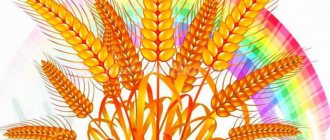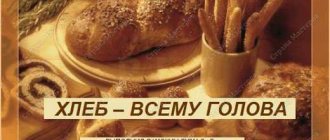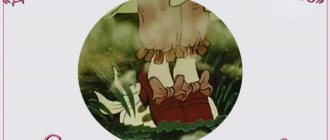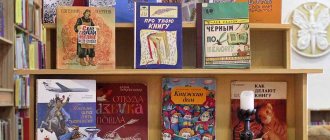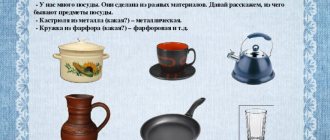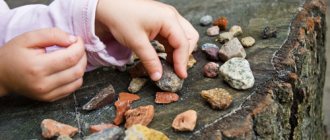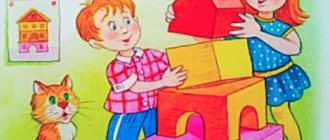History of bread for children
What was the first bread?
Each product has its own history. Such a universal product as bread exists in almost all countries of the world. Bread has come a long, complex way before it takes the form of beautiful loaves on our table.
15 thousand years ago
Our ancestors, in search of food, came across
cereal plants.
Ancient people simply collected grains and ate them raw. Later, they learned to grind the grains between stones, pour water into the resulting mass, reminiscent of flour, and cook it. So we can say with confidence that the first bread was a nutritious mushy mass of flour and water. People realized that porridge made from roasted grains tasted better and began to make it thicker and bake it. The first unleavened bread cakes were produced - the world history of bread baking begins with them. During these times, the first ovens, dishes, mortars for grinding grains, and mills with millstones were created.
Fluke
Lush bread did not appear immediately; it happened about 5
thousand years ago
.
According to legend, one of the slaves in ancient Egypt
forgot about the dough, and it fermented a little. He couldn’t leave his owners without bread, so he still put the dough in the oven. Everyone was surprised by the appetizing appearance and wonderful taste of the new loaf. It retained freshness longer and was better absorbed by the body. Instead of punishment, the slave was asked to tell what he did to make the bread so soft and rosy. Having broken the bread, the ancient people saw that it was full of small holes inside; this was air that appeared during the fermentation process.
In Russia in the 11th century
Sour rye bread was baked using sourdough from previous baking. The sourdough recipe has been passed down from generation to generation.
Yeast did not exist in its pure form, so instead, fermented grape juice, beer foam, leaven made from flour and wine were mixed into the dough, or the dough was simply left for a long time so that it would rise on its own. In Rome and Greece, bread made from slightly fermented dough
considered food for rich people, it was served as a separate dish. The slaves had to be content with coarse bread; the dough for it was not fermented, but baked immediately. Different variations of bread appeared - with milk, sugar, poppy seeds, honey.
The first bakers and automation
The ability to bake delicious, fluffy bread was highly valued in those days, so bakers were cherished. For the murder of a baker, a man was immediately executed,
after all, it could provoke famine. But if the baker himself made bad bread, he was punished to the fullest extent, because people obtained flour with great difficulty, and it was impossible to transfer it to unsuccessful baking. And recipes for good bread were kept secret. Bakers and their students over time developed certain recipes, norms and rules for baking bread.
By the 19th century
the process of growing wheat, harvesting, milling and baking
was automated.
And of course, now we cannot fully understand how difficult it was for our ancestors to get bread. Now making homemade bread will not be difficult.
Bread as the basis of life
For Russians, bread is more than just a food product; it is part of their cultural heritage
.
There are many traditions where bread plays a big role; remember even the tradition of meeting honored guests with “bread and salt”, a loaf for newlyweds.
Bread is treated with reverence and children are taught this.
It is unlikely that people will ever stop eating bread. Bread production will never lose its relevance.
No matter what form bread appears before us - flatbread, loaf or baguette, it remains the connecting link of all countries of the world. Bread is a symbol of hard work and well-being created with your own hands.
Light bread - Russian fairy tale
Details Category: Russian fairy tale
Page 1 of 2
Light bread
A mower was mowing the meadow. I got tired and sat down under a bush to rest. He took out the bag, untied it and began to chew the bread. A hungry wolf comes out of the forest. He sees a mower sitting under a bush and eating something.
The wolf approached him and asked: “What are you eating, man?” “Bread,” the mower answers. - Is it tasty? - And how delicious it is! - Let me taste it. - Well, try it. The mower broke off a piece of bread and gave it to the wolf. The wolf liked the bread. He says: “I would like to eat bread every day, but where can I get it?” Tell me, man! “Okay,” says the mower, “I’ll teach you where and how to get bread.” And he began to teach the wolf. - First of all, we need to plow the land... - Then there will be bread? - No, brother, wait. Then you need to harrow the ground... - And can you eat bread? - The wolf waved his tail. - What are you saying, wait a minute. First you need to sow rye... - Then there will be bread? - the wolf licked his lips. - Not yet. Wait until the rye sprouts, survives the cold winter, grows in the spring, blooms a lot, then begins to spike, then ripen...
“Oh,” the wolf sighed, “however, we have to wait a long time!” But then I’ll eat plenty of bread!.. - Where can you eat! - the mower interrupted him. - It's too early. First you need to squeeze the ripe rye, then tie it into sheaves, put the sheaves in heaps. The wind will blow them away, the sun will dry them, then take them to the current... - And will I eat bread? - Eh, so impatient! First you need to thresh the sheaves, pour the grain into bags, take the bags to the mill and grind the flour... - That's all? - No, not everything. You need to knead the flour in the bowl and wait for the dough to rise. Then place it in a hot oven. - And will the bread be baked? - Yes, the bread will be baked. “That’s when you’ll eat it,” the mower finished his lesson. The wolf thought for a moment, scratched the back of his head with his paw and said: “No!” This work is painfully long and hard. Better advise me, man, how to get food easier. “Well,” says the mower, “if you don’t want to eat heavy bread, eat light bread.” Go to the pasture, the horse is grazing there. A wolf came to the pasture. I saw a horse. - Horse, horse! I will eat you. “Well,” says the horse, “eat.” Just take the horseshoes off my feet first, so as not to break your teeth on them. “And that’s true,” the wolf agreed. He bent down to take off the horseshoes, and the horse hit him in the teeth with its hoof... The wolf somersaulted and ran.
www.planetaskazok.ru
? Light bread? | Fairy tales for children. Stories and fairy tales with pictures
Fairy tales » Tales of the peoples of the world » Belarusian folk tales » Light bread
A mower was mowing the meadow. I got tired and sat down under a bush to rest. He took out the bag, untied it and began to chew the bread.
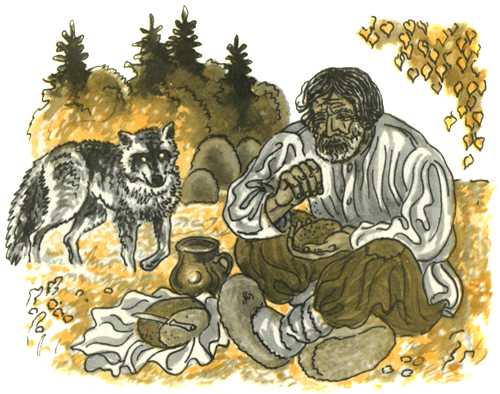
A hungry wolf comes out of the forest. He sees a mower sitting under a bush and eating something. The wolf approached him and asked: “What are you eating, man?” “Bread,” the mower answers. - Is it tasty? - And how delicious it is! - Let me taste it. - Well, try it. The mower broke off a piece of bread and gave it to the wolf.
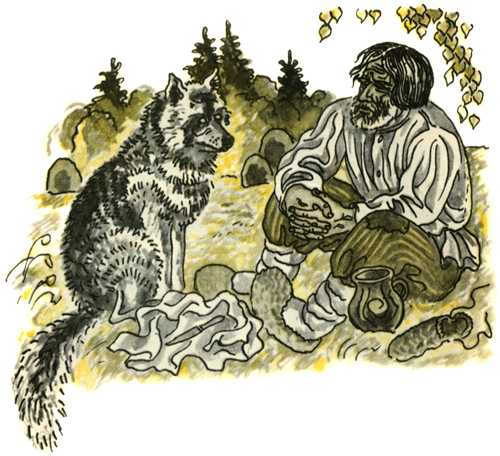
The wolf liked the bread. He says: “I would like to eat bread every day, but where can I get it?” Tell me, man! “Okay,” says the mower, “I’ll teach you where and how to get bread.” And he began to lecture the wolf: “First of all, you need to plow the land...
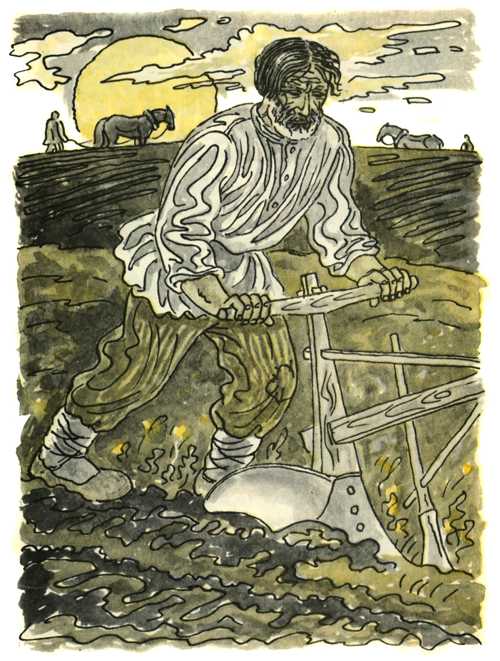
- Then there will be bread? - No, brother, wait. Then you need to harrow the ground... - And can you eat bread? - The wolf waved his tail. - What are you saying, wait a minute. First you need to sow rye... - Then there will be bread? - the wolf licked his lips. - Not yet. Wait until the rye sprouts, survives the cold winter, grows in the spring, then blooms, then begins to spike, then ripens...
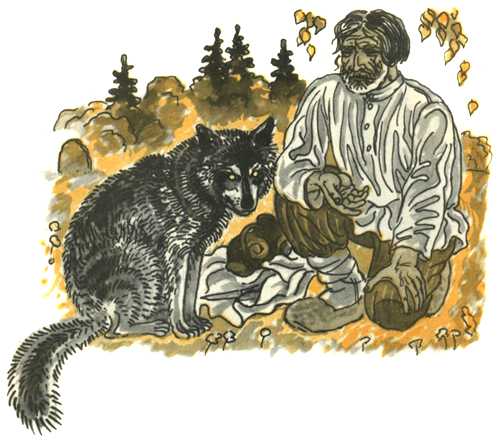
“Oh,” the wolf sighed, “however, we have to wait a long time!” But then I’ll eat plenty of bread!.. - Where can you eat! - the mower interrupted him. - It's too early. First you need to squeeze the ripe rye, then tie it into sheaves, put the sheaves in heaps. The wind will blow them away, the sun will dry them, then take them to the current...
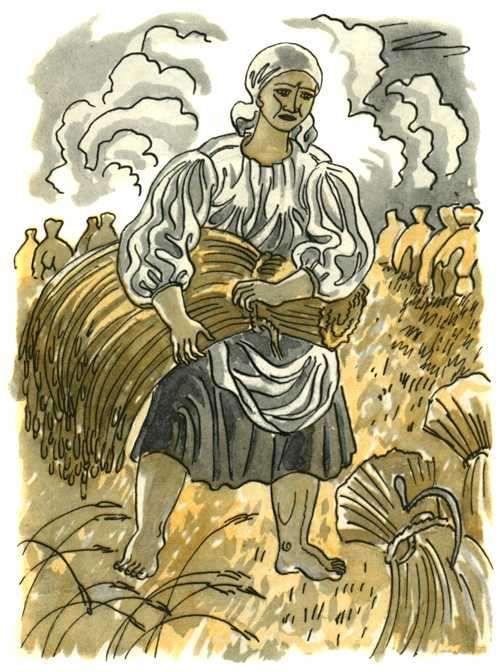
- And will I eat bread? - Eh, so impatient! First you need to thresh the sheaves, pour the grain into bags, take the bags to the mill and grind the flour... - That's all? - No, not all. You need to knead the flour in a bowl and wait until the dough rises. Then place it in a hot oven.
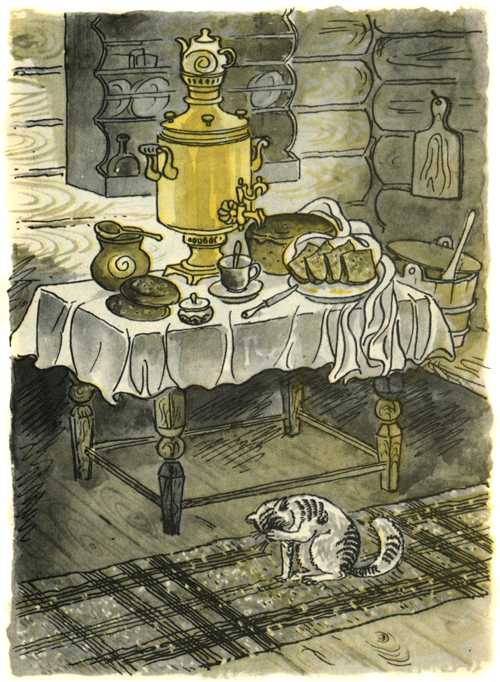
- And will the bread be baked? - Yes, the bread will be baked. “That’s when you’ll eat it,” the mower finished his lecture. The wolf thought for a moment, scratched the back of his head with his paw and said: “No!” This work is painfully long and hard. Better advise me, man, how to get food easier.
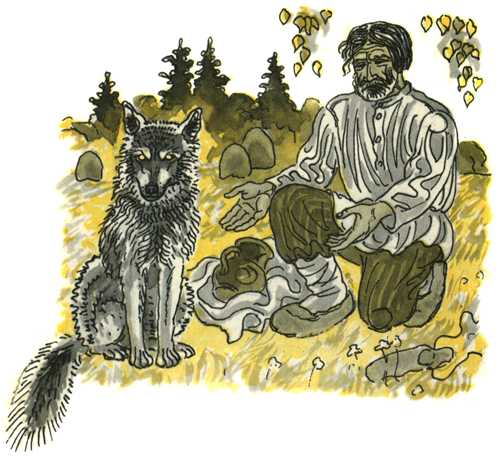
“Well,” says the mower, “since you don’t want to eat heavy bread, eat light bread.” Go to the pasture, the horse is grazing there. The wolf came to the pasture. I saw a horse. - Horse, horse! I will eat you. “Well,” says the horse, “eat.” Just take the horseshoes off my feet first, so as not to break your teeth on them.
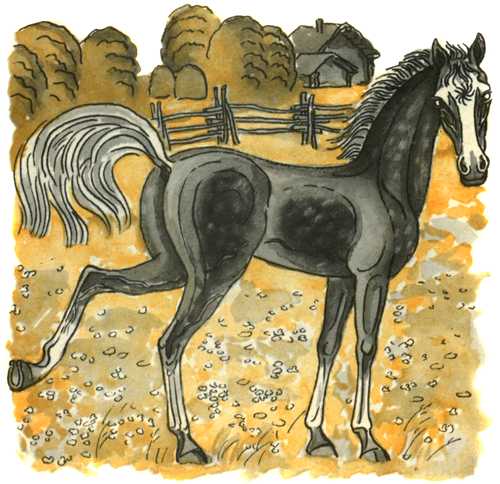
“And that’s true,” the wolf agreed. He bent down to take off the horseshoes, and the horse hit him in the teeth with its hoof...
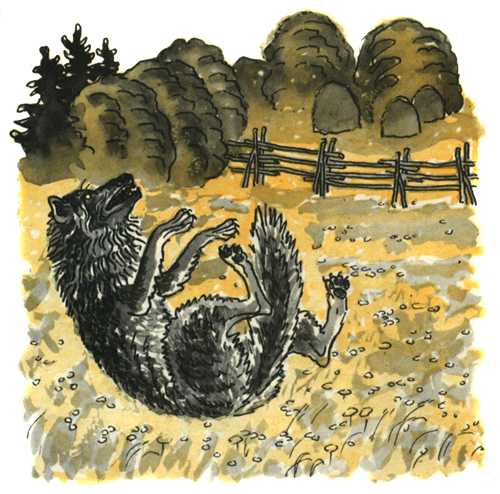
The wolf somersaulted and ran.
He ran to the river. He sees geese grazing on the shore. “Should I eat them?” - thinks. Then he says: “Geese, geese!” I'll eat you. “Well,” the geese answer, “eat.” But first, do us one favor before you die. - Which one? - Sing to us, and we will listen. - It's possible. I am a master of singing. The wolf sat down on a hummock, raised his head and began to howl. And the geese, flapping and flapping their wings, rose up and flew away.
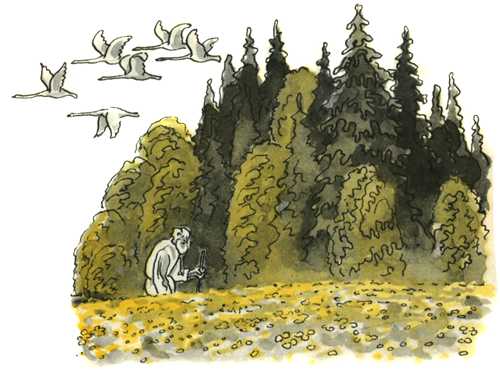
The wolf got down from the hummock, looked after the geese and went away empty-handed. He goes and scolds himself with the last words: “What a fool I am! Why did you agree to sing? Well, now I’ll eat whoever I meet!”
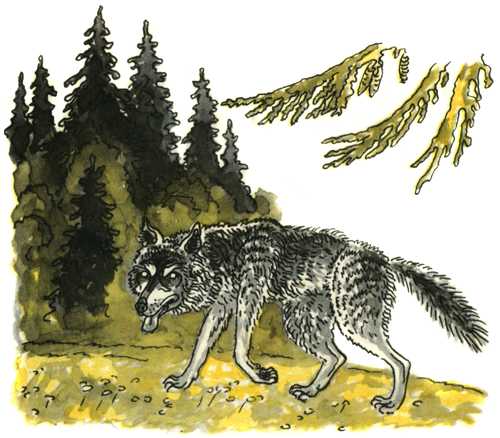
Just when he thought so, lo and behold, an old grandfather was walking along the road. The wolf ran up to him: “Grandfather, grandfather, I will eat you!” - And why is it in such a hurry? - says the grandfather. - Let's smell the tobacco first. - Is it tasty? - Try it and you'll find out. - Let's. The grandfather took a tobacco pouch out of his pocket, sniffed it himself and gave it to the wolf.
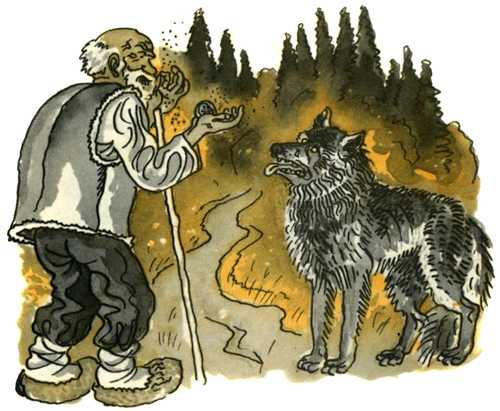
As the wolf sniffed with all his might, he inhaled the entire pouch of tobacco. And then he started sneezing all over the forest... He can’t see anything because of his tears, he keeps sneezing. He sneezed like this for an hour until all the tobacco was sneezed out. I looked around, and there was no trace of my grandfather. The wolf moved on. He walks, walks, and sees a flock of sheep grazing in a field, and the shepherd is sleeping. The wolf spotted the best ram in the herd, grabbed it and said: - Ram, ram, I will eat you! “Well,” says the ram, “this is my lot.” But so that you don’t suffer for a long time and don’t break your teeth on my old bones, you better stand in that hollow over there and open your mouth, and I’ll run up the hill, accelerate and draw you into my mouth.
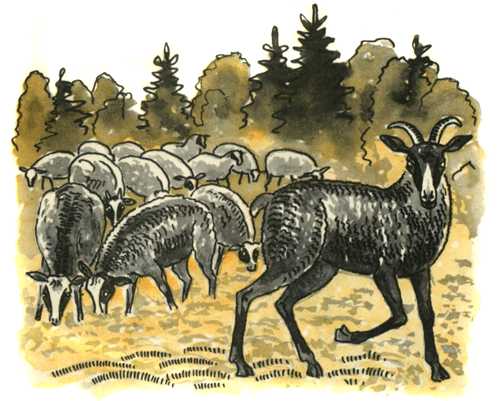
“Thanks for the advice,” says the wolf. - That's what we'll do. He stood in the hollow, opened his mouth and waited. And the ram ran up the hill, sped up and hit the wolf on the head with its horns. So sparks fell from the gray one’s eyes, and the whole light began to spin in front of him! The wolf came to his senses, turned his head and reasoned with himself: “Did I eat it or not?” Meanwhile, the mower has finished his work and goes home. He heard the wolf’s words and said: “I didn’t eat anything, but I did taste some light bread.”
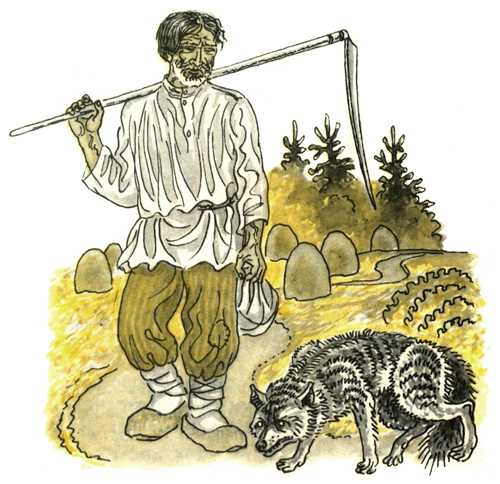
END
—— * bowl - a wooden tub in which dough is usually kneaded; sauerkraut
Did you like the fairy tale? Then share it with your friends: Put the book on your shelf Print the story
The path from grain to loaf of bread
Bread has a special place in our diet. Without bread, nutrition for both healthy people and those who need food is unimaginable. Moreover, bread has a rather rare property as a food - it never becomes boring, which allows you to include it in your diet every day.
Bread is an important and affordable source of valuable vegetable protein, which contains a number of essential amino acids (methionine, lysine). Wheat bread contains more protein than rye bread (8.6 and 5.6%).
Bread is especially rich in carbohydrates (rye 40 - 43%, wheat 42 - 52%), contains little fat - from 0.6 to 2.9%.
Bread is an important source of B vitamins. It serves as a daily supplier of plant fiber. Finally, bread is a source of minerals the body needs, namely potassium, calcium, magnesium, sodium, phosphorus and iron.
Bread is not easy to reach our table. A loaf of bread begins with grain. It takes 1200 grains to bake one loaf of bread. And for a small grain to become bread, three forces are needed: earth, sun, work. Bread is the work of thousands and thousands of hands.
His journey begins in early spring, when cars drive up to the fields. Those who drive a car have a lot of work: They need to plow the field, loosen the soil - quickly prepare it for sowing. They say: “ Spring is the food for the year.” After some time, other machines are working in the field. Seeders are used to quickly sow huge fields.
Before sowing wheat, the grain is checked for germination. They are sorted on special machines called sorting machines. For sowing you need medium, normal grains. All grains in spring and winter. Grains are sown in the spring and harvested in the fall. Winter crops are sown in August-September and harvested in June-July; they bring a large harvest.
Grains sprout in the field and shoots appear. In summer the whole field is a mess.
When autumn comes, the ears of the corn turn golden. The bread is ripe. It's time to harvest. And again the cars entered the field. These are combines.
And then the grain is delivered by car to the elevator, where it is protected from cold, moisture and harmful insects.
Then the grain is sent to grain mills, and from there the flour goes to bakeries and confectionery shops.
From the bakery, the finished bread is delivered to the stores in special vehicles.
And from stores, bread comes to our table in the form of a huge assortment of bakery products (more than 100 types of bread, cookies, muffins, buns, pies, birthday cakes, crackers, etc.).
The path from grain to loaf of bread is shown in the figure in Appendix 1.
"A piece of bread"
A. Nuikin’s story “A Piece of Bread” will help a child understand a lot about the importance of bread. It describes a case of a piece of bread lying on the sidewalk. People walked by: young, old, children. One boy took a piece and kicked it into the middle of the road. Suddenly he heard someone say about sin. I looked around and saw an old man. He looked left and right and quietly walked towards the piece. Then he carried it to the lawn with the hope of feeding the birds.
The old man stood and thought about his hungry childhood, when even for the holiday his mother mixed grass or seeds into the flour. She worked alone, and there were eight hungry people.
This old man knew the times of famine, he knows how bread was obtained. Picking up a piece of bread, he mentally bowed to the hard work of the people who grow it, and to the calloused hands of the grain grower. For an old man, bread is a sacred thing, which he will always treat with care. And he wants everyone, including the younger generation, to value bread in the same way.
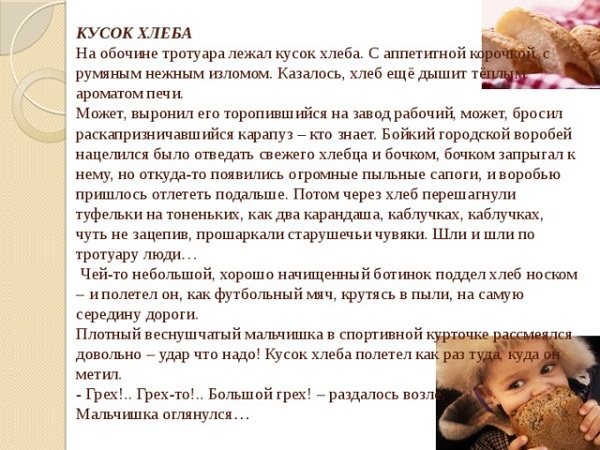
"The Girl Who Stepped on Bread"
A child should read the fairy tale by G.Kh. Andersen about a poor but proud girl who loved to torture insects. When she began to serve in the landowner's house, the owners reminded her that she needed to visit her parents. She went. But when she saw her mother with a bundle of brushwood, she felt ashamed that she was so ragged. And Inge left without seeing her mother.
Six months later she was again reminded of her mother. She took the white bread they gave her and went. She was dressed in a beautiful dress and had new shoes. When she encountered a dirty puddle, she threw bread at her feet and then stepped on it. And suddenly she began to be pulled into the ground. That's how she ended up with the swamp woman.
Where the swamp woman lived was a very dirty place. The devil and a poisonous old woman came to visit her, and Inge really liked her. She wanted to make an idol out of her. The girl, having gone to hell, saw the torment of sinners. And her torment was just beginning. She was hungry and wanted to break off some bread, but she could not move. She petrified, turned into an idol. Then she felt hot tears dripping onto her. It was her mother crying. Everyone on earth already knew about her sin. People even composed a song about a arrogant girl who stepped on bread.
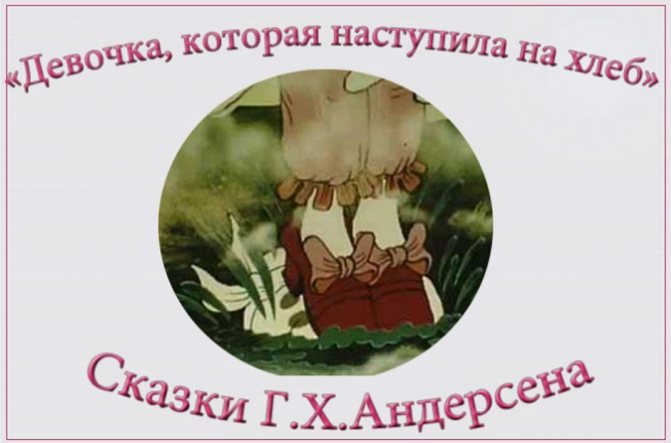
Inge has only heard bad things about herself. But still, one little girl, having heard the story about her, felt sorry for her. The little one really wanted Inge to ask for forgiveness. The girl called her poor and was very sorry.
Everyone has already died: the mother, the mistress for whom Inge worked. The girl who thought about Inga also became old. And Inge thought about the fact that a stranger loved her and cried for her. She cried, and her stone shell melted. The girl turned into a bird.
Since then she has been flying and collecting crumbs. She eats only one, and then calls other birds. She gave away as many crumbs as there were in the bread she stepped on.
Introduction
Bread is a food product that is baked from flour. The word "bread" is believed to be of Greek origin. Ancient Greek bakers used special pots called klibanos to make this product. As for the origin of the Russian word "bread", it was associated with the borrowed name Gleb or the verb "bread".
A constant abundance of bread is the cherished dream of millions of people living on earth. Bread is not expensive, but not everyone knows how difficult it is to get it and what its true price is. Bread goes through a long and difficult journey before it reaches our table. To grow grain in the fields day and night, under the scorching rays of the sun and torrential rains, thousands of people work in more than 120 specialties (breeders, agronomists, engineers, mechanics, elevator workers, grain mills, builders, car enthusiasts, bakers, salesmen, tractor drivers, combine harvesters and etc.).
The Russian people have always treated bread with reverence, as a gift that saves from hunger, as wealth.
Relevance of the problem: the attitude of young people to bread in general and to gymnasts in particular
The purpose of my work is to find out from gymnasts their knowledge about bread and their attitude towards this product.
To achieve this goal, the following tasks were set:
- Selection and study of literature on this topic.
- Drawing conclusions from the reviewed literature
- Comparison of the obtained practical and theoretical data
- summarize.
At the beginning of the work, the following hypothesis was formulated:
“If a person knows how much work it takes to put bread on our table, he will be more careful.”
The work used both theoretical research and practical work.
Tales about bread and work
Cautionary tales
I really love short, wise fairy tales, when only the most important things are said in a few sentences. I recently read a couple of wonderful educational tales that I want to share with you:
Latvian fairy tale about bread
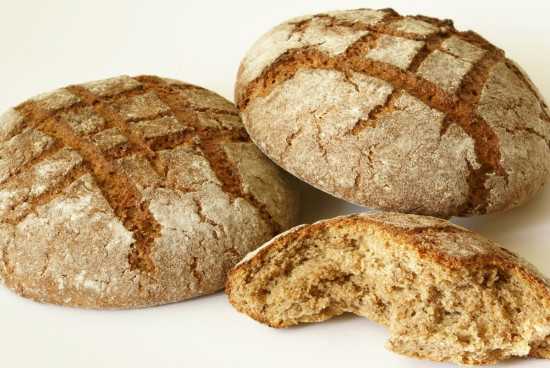
One day, a wolf, exhausted from hunger, asked a shepherd for food. The shepherd gave the wolf a large piece of bread.
“What delicious food you people have,” said the wolf. - If we ate such food, we would not attack your sheep. How is it made?
“It’s a long story,” said the shepherd. “First we need to plow the land.”
“And can I eat?!”
"No. Wait a minute. Then you need to sow the land.”
“And can I eat?!”
“Wait a minute. I told you, it’s a long story.”
And the shepherd continued to tell the wolf a long chain of agricultural operations about how to wait for the harvest, then reap, stack, thresh, dry, grind, bake... The wolf kept getting involved with the question: “And can I eat?” And at the end he said: “You people have delicious food, but it’s difficult. Apparently, we will attack your sheep.”
All human life is a mixture of difficult and tasty, difficult and beautiful. A huge amount of work goes into the light of an ordinary light bulb or the stream of water from a tap. This other people's work needs to be appreciated, and the best way is to work yourself. Only what has been washed by mom gets dirty easily. What he washed and ironed himself is taken care of more carefully and is reluctant to get dirty.
Serbian tale of the beggar king
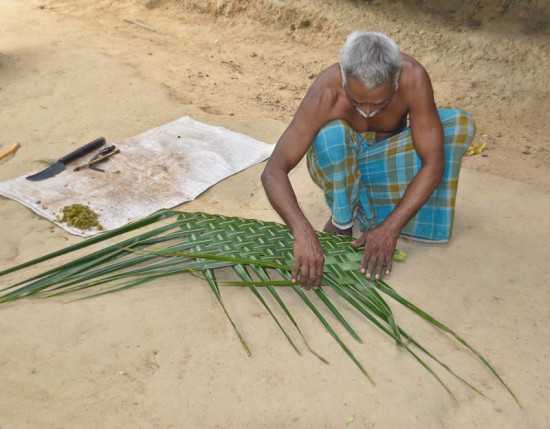
Once upon a time there was a king who set out on a journey by sea with his wife and daughter, and they were shipwrecked. They washed ashore in an unknown country. There, not knowing the crafts, they began to herd other people's sheep, leading a miserable life. It happened, however, that the king of that country was looking for a bride for his son. They walked around the kingdom, saw all the girls - and chose a dazzlingly beautiful poor girl - the daughter of this shepherd. The prince offered her his hand and heart, but the girl’s father gave her an ultimatum: “I won’t give up my daughter until you, prince, learn one of the crafts.” The prince was indignant, but obeyed the will of his future father-in-law and learned to weave mats. He wove two pieces and came again to woo.
“How much does one mat cost?” - asked the shepherd. “Two pennies,” answered the prince. “How long did it take you to weave them?” "Per day". “Four pennies a day...” thought the old man. - OK. Take my daughter." “Thank you, father. But now explain why you need all this? After all, I am a prince. I will need to run the country, not weave mats.” “Oh, son,” answered the shepherd. “And I was a king.” But if I could at least weave mats, then after the loss of the kingdom my family would have lived a little better.”
From the book “The First Miracle” (Archpriest Andrei Tkachev)
We have selected 5 more interesting articles for you:
grow-clever.com
Bread for the whole head
Each of us should have heard about the need to treat bread with respect and care. However, the reason for this is usually described as a single whole: In bread, they say, there is hard human labor. At the same time, hard work goes into every good thing or food. So why is the bread “whole head”? The fact is that today only a few remember the deep mythological roots that our views on bread have.
Bread was a holy gift from the gods to the Slavs. After we mastered the preparation of porridge and pancakes, our ancient ancestors, one way or another, turned to bread. We all happened to see (and touch) the cake batter. It seems to be completely alive - warm, soft, breathing. There are many old beliefs associated with bread and dough. Here are some of them.
Returning home from a funeral, our ancestors first tried to look into the test pot so that the holy power of life would cross the threshold of death.
Before the wedding, the bride sat on a cushion-covered sourdough so that the new family could live happily, richly, in harmony and with many children.
When we took the bread out of the oven, we noticed in which direction the tops of the carpets bent: when in the oven - to come into the house, outside - to spoil and cause trouble. At weddings, bread baked in the bride’s house was mixed with bread baked in the groom’s house: from now on, two families will be “bread from the same oven”...
Bread was associated in Russia with all pressing daily needs.
In our speech there are such established expressions:
- “To earn bread” means to earn what is necessary to feed oneself in order to exist.
- “Grain place” is a profitable job.
- “Your piece of bread” is to earn your living.
- “Giving bread” means giving someone income.
- “Take away bread” means to take away a place or fishing, a source of income.
Someone's powerful hobby says: "Don't feed it bread..."
Something that does not bother anyone and that may be useful is said: “She does not ask for bread.
Russian proverbs contain centuries-old national wisdom and national experience.
Here's one of many about bread:
- Bread all over my head.
- Bread along the way is not a burden.
- Bread is the land, and under the spruce there is not a piece of heavenly bread, but in the trenches there is melancholy.
- No bread, no friends.
- Not a piece of bread, and I feel sorry in my throat.
- Bread is moderation, money is account.
- God is on the wall, bread is on the table.
Many Russian poets and artists sang about the Russian field, hard peasant labor and the fruits of this labor - bread.
These days, unfortunately, many have begun to forget about the true price of bread. But there are people who still remember how difficult it was to get bread during the war. And how many people died of hunger! I would like to recall the achievements of scientists from the All-Union Institute of Plant Growing, the famous VIR, founded by N.I. Babilov.
Fourteen men, weakened by hunger, did not leave their posts and protected thousands of grain samples from frost and moisture, fire bombs and rats. Dmitry Sergeevich Ivanov died of hunger. And thousands of bags of grain remained in his office. Alexander Gavrilovich Shchukin, who died of hunger, prepared another copy of the collection in the hope of transporting it by plane to the Great Land. Of the 14 employees, only five survived. They believed in victory. They knew that after the war the country would need the collections that they saved by sacrificing their own lives. So that bread from the collected grain could save a thousand lives, Leningraders realized that scientists would store the bread of the future. The war ended, and based on the preserved collection, the best wheat varieties of the post-war period were created. In the name of their memory, we must protect and store the bread that we have.
You and I don’t know what hunger is, bread cards, the taste of bread mixed with hay, straw, bark, swan seeds. But during the war with Nazi Germany, when the Germans surrounded the city of St. Petersburg (Leningrad) and did not allow the import of food, workers received 250 grams of bread per day, and residents received even less - 125 grams per day.
Reading the memoirs of residents of besieged Leningrad, you begin to think about bread. We need to talk about the attitude towards it, write so that children do not grow up ignorant, so that for them there are words of the Motherland, friendship, peace, father, mother, the word bread. It is necessary to instill a moral attitude towards bread from childhood - a cautious attitude. And here we often see a picture that reacts painfully to the heart: abandoned bread, trampled in dirty waste, buns in a trash can. This is proof of an immoral act.
We treat bread as something familiar. Well, that's wrong. There is nothing in the world that is worth more than bread crumbs. After all, bread is a noun! And not because this word refers to that part of speech. Because for us this is the most important thing, the essence of our life.
Conclusion
To grow grain in the fields, day and night, under the scorching rays of the sun and torrential rains, thousands of people work in more than 120 professions, so bread for the Slavs since ancient times was a sacred gift of the gods and was associated with all the needs of life.
Many Russian poets and artists sang about the Russian field, hard peasant labor and the fruits of this labor - bread.
During the Great Patriotic War, people, at the cost of their own health, and sometimes even their lives, saved bread, which gives life to thousands of other people, but now bread is inaccessible to 1/6 of the planet’s population.
The younger generation treats bread as something familiar. 10% of respondents use bread as a game during breaks, which is an indicator of the immorality of my peers.
Bread is not only food. This is the hard work of thousands of people who put their soul and love into it and want the fruits of their labor to bring joy and prosperity to every home. Nowadays, many have begun to forget about the true price of bread. But there are people who still remember how difficult it was to get bread during the war. And how many people died of hunger! For their memory we must cherish bread and preserve what we have.
